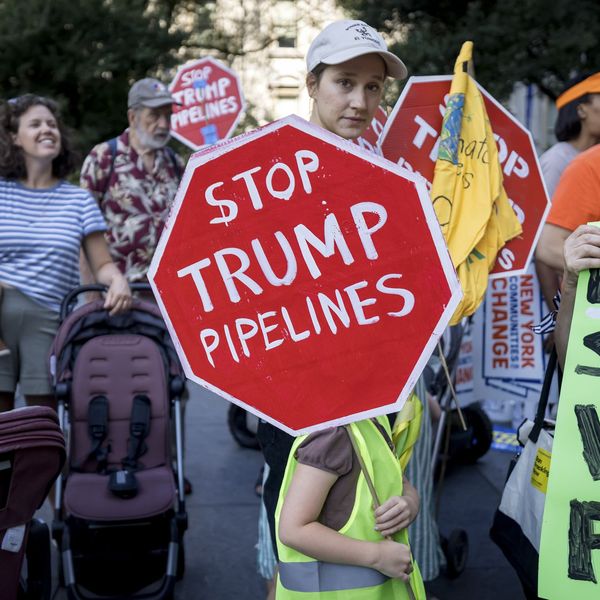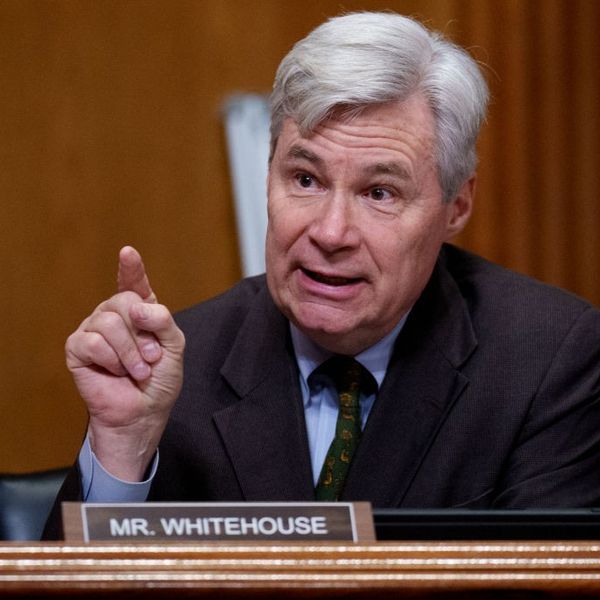Vote "No" on House Bill to Fast-Track Keystone Pipeline Review
As early as today, the House will decide whether to rush a ruling over Big Oil's plan to run a pipeline through the American heartland to deliver the dirtiest oil on the planet from Canada to the Gulf of Mexico.

The bill -- H.R. 1938 - would fast-track the vital environmental review this perilous pipeline proposal demands. This legislation deserves a swift and sound defeat. We must all call on our congressmen today to vote against it.
The bill is meant to improve the prospects for the proposed Keystone XL pipeline, which would snake its way 1,711 miles from Canada to Texas to take tar sands crude oil to Gulf coast refineries.
Because it would cross the U.S. border, the pipeline requires a presidential determination that it is in our national interest. It also requires an environmental review. The U.S. State Department is responsible for both.
The State Department expects to have a preliminary environmental assessment completed by mid-August. It has said it would complete its review of a determination of national interest by year's end.
That's not fast enough for Rep. Lee Terry, R-Neb. He's sponsored a bill that seeks to tie the hands of our diplomatic corps, by setting an arbitrary deadline of Nov. 1 for a final decision.
In other words, rather than allowing for the full and fair environmental and national security assessment this project requires, Terry's bill would ramrod the process.
Who would get shortchanged? Not just the career foreign service officers trying to reach an informed judgment, but the American people.
We're counting on the State Department to do its homework and come clean about the way this project would expose American waters, croplands and communities to grave and unacceptable risks.
The White House opposes this bill.
"The bill is unnecessary, because the Department of State has been working diligently to complete the permit decision process," the White House noted Monday in an official statement of administration policy. Further, the statement continues, the bill would interfere with the executive authority to assess "complex issues which could have serious security, safety, environmental and other ramifications."
Congress has plenty to do, it would seem, without needlessly injecting itself into the State Department's work. Our professional diplomatic corps doesn't need the likes of Lee Terry hovering about with a stopwatch meant to hurry up important environmental review.
If anything, we need State to bear down and work harder.
In a June comment letter, the Environmental Protection Agency found key deficiencies in the State Department's environmental review to date.
The proposed route, for example, would take the pipeline through 250 miles of the Ogallala Aquifer, the source of clean drinking water for millions of Americans and the single largest pool of irrigation water in the country.
With stakes this high, the National Environmental Policy Act requires the consideration of alternate routes. That has not been done.
The EPA also wants public hearings to consider the potential harm to communities along the pipeline route and near the refineries where the tar sands crude might be processed. That's only prudent and fair.
What about the toxic stew of chemicals and volatile natural gas liquids used to help get tar sands crude to flow, under heat and high pressure, through the pipelines? More needs to be disclosed about that, the EPA asserts.
Finally, the EPA wants more information developed on the risks this pipeline would pose to wetlands and migratory birds, so that mitigation measures can be put in place to protect them before a crisis occurs.
It was a year ago this month, after all, that another tar sands pipeline spilled 840,000 gallons of toxic crude into Michigan's Kalamazoo River. A 30-mile stretch remains closed due to the pollution, and crude has contaminated nearby Morrow Lake, where some 200 acres of shoreline and bottom are covered in heavy oil.
Clean up workers are still struggling, for that matter, to mop up some 42,000 gallons of toxic crude oil that poured into the Yellowstone River several weeks ago, after yet another pipeline ruptured there.
Before the State Department can make a determination about the hazards of the Keystone XL pipeline, we need to know more about the risks these types of blowouts pose to the waters, wildlife and lands we depend on and cherish.
The policy must be guided by science, not the ticking of some artificial clock - whether it's set by Big Oil and its allies on Capitol Hill or by administration officials rushing to complete the process before performing a thorough review.
An Urgent Message From Our Co-Founder
Dear Common Dreams reader, The U.S. is on a fast track to authoritarianism like nothing I've ever seen. Meanwhile, corporate news outlets are utterly capitulating to Trump, twisting their coverage to avoid drawing his ire while lining up to stuff cash in his pockets. That's why I believe that Common Dreams is doing the best and most consequential reporting that we've ever done. Our small but mighty team is a progressive reporting powerhouse, covering the news every day that the corporate media never will. Our mission has always been simple: To inform. To inspire. And to ignite change for the common good. Now here's the key piece that I want all our readers to understand: None of this would be possible without your financial support. That's not just some fundraising cliche. It's the absolute and literal truth. We don't accept corporate advertising and never will. We don't have a paywall because we don't think people should be blocked from critical news based on their ability to pay. Everything we do is funded by the donations of readers like you. Will you donate now to help power the nonprofit, independent reporting of Common Dreams? Thank you for being a vital member of our community. Together, we can keep independent journalism alive when it’s needed most. - Craig Brown, Co-founder |
As early as today, the House will decide whether to rush a ruling over Big Oil's plan to run a pipeline through the American heartland to deliver the dirtiest oil on the planet from Canada to the Gulf of Mexico.

The bill -- H.R. 1938 - would fast-track the vital environmental review this perilous pipeline proposal demands. This legislation deserves a swift and sound defeat. We must all call on our congressmen today to vote against it.
The bill is meant to improve the prospects for the proposed Keystone XL pipeline, which would snake its way 1,711 miles from Canada to Texas to take tar sands crude oil to Gulf coast refineries.
Because it would cross the U.S. border, the pipeline requires a presidential determination that it is in our national interest. It also requires an environmental review. The U.S. State Department is responsible for both.
The State Department expects to have a preliminary environmental assessment completed by mid-August. It has said it would complete its review of a determination of national interest by year's end.
That's not fast enough for Rep. Lee Terry, R-Neb. He's sponsored a bill that seeks to tie the hands of our diplomatic corps, by setting an arbitrary deadline of Nov. 1 for a final decision.
In other words, rather than allowing for the full and fair environmental and national security assessment this project requires, Terry's bill would ramrod the process.
Who would get shortchanged? Not just the career foreign service officers trying to reach an informed judgment, but the American people.
We're counting on the State Department to do its homework and come clean about the way this project would expose American waters, croplands and communities to grave and unacceptable risks.
The White House opposes this bill.
"The bill is unnecessary, because the Department of State has been working diligently to complete the permit decision process," the White House noted Monday in an official statement of administration policy. Further, the statement continues, the bill would interfere with the executive authority to assess "complex issues which could have serious security, safety, environmental and other ramifications."
Congress has plenty to do, it would seem, without needlessly injecting itself into the State Department's work. Our professional diplomatic corps doesn't need the likes of Lee Terry hovering about with a stopwatch meant to hurry up important environmental review.
If anything, we need State to bear down and work harder.
In a June comment letter, the Environmental Protection Agency found key deficiencies in the State Department's environmental review to date.
The proposed route, for example, would take the pipeline through 250 miles of the Ogallala Aquifer, the source of clean drinking water for millions of Americans and the single largest pool of irrigation water in the country.
With stakes this high, the National Environmental Policy Act requires the consideration of alternate routes. That has not been done.
The EPA also wants public hearings to consider the potential harm to communities along the pipeline route and near the refineries where the tar sands crude might be processed. That's only prudent and fair.
What about the toxic stew of chemicals and volatile natural gas liquids used to help get tar sands crude to flow, under heat and high pressure, through the pipelines? More needs to be disclosed about that, the EPA asserts.
Finally, the EPA wants more information developed on the risks this pipeline would pose to wetlands and migratory birds, so that mitigation measures can be put in place to protect them before a crisis occurs.
It was a year ago this month, after all, that another tar sands pipeline spilled 840,000 gallons of toxic crude into Michigan's Kalamazoo River. A 30-mile stretch remains closed due to the pollution, and crude has contaminated nearby Morrow Lake, where some 200 acres of shoreline and bottom are covered in heavy oil.
Clean up workers are still struggling, for that matter, to mop up some 42,000 gallons of toxic crude oil that poured into the Yellowstone River several weeks ago, after yet another pipeline ruptured there.
Before the State Department can make a determination about the hazards of the Keystone XL pipeline, we need to know more about the risks these types of blowouts pose to the waters, wildlife and lands we depend on and cherish.
The policy must be guided by science, not the ticking of some artificial clock - whether it's set by Big Oil and its allies on Capitol Hill or by administration officials rushing to complete the process before performing a thorough review.
As early as today, the House will decide whether to rush a ruling over Big Oil's plan to run a pipeline through the American heartland to deliver the dirtiest oil on the planet from Canada to the Gulf of Mexico.

The bill -- H.R. 1938 - would fast-track the vital environmental review this perilous pipeline proposal demands. This legislation deserves a swift and sound defeat. We must all call on our congressmen today to vote against it.
The bill is meant to improve the prospects for the proposed Keystone XL pipeline, which would snake its way 1,711 miles from Canada to Texas to take tar sands crude oil to Gulf coast refineries.
Because it would cross the U.S. border, the pipeline requires a presidential determination that it is in our national interest. It also requires an environmental review. The U.S. State Department is responsible for both.
The State Department expects to have a preliminary environmental assessment completed by mid-August. It has said it would complete its review of a determination of national interest by year's end.
That's not fast enough for Rep. Lee Terry, R-Neb. He's sponsored a bill that seeks to tie the hands of our diplomatic corps, by setting an arbitrary deadline of Nov. 1 for a final decision.
In other words, rather than allowing for the full and fair environmental and national security assessment this project requires, Terry's bill would ramrod the process.
Who would get shortchanged? Not just the career foreign service officers trying to reach an informed judgment, but the American people.
We're counting on the State Department to do its homework and come clean about the way this project would expose American waters, croplands and communities to grave and unacceptable risks.
The White House opposes this bill.
"The bill is unnecessary, because the Department of State has been working diligently to complete the permit decision process," the White House noted Monday in an official statement of administration policy. Further, the statement continues, the bill would interfere with the executive authority to assess "complex issues which could have serious security, safety, environmental and other ramifications."
Congress has plenty to do, it would seem, without needlessly injecting itself into the State Department's work. Our professional diplomatic corps doesn't need the likes of Lee Terry hovering about with a stopwatch meant to hurry up important environmental review.
If anything, we need State to bear down and work harder.
In a June comment letter, the Environmental Protection Agency found key deficiencies in the State Department's environmental review to date.
The proposed route, for example, would take the pipeline through 250 miles of the Ogallala Aquifer, the source of clean drinking water for millions of Americans and the single largest pool of irrigation water in the country.
With stakes this high, the National Environmental Policy Act requires the consideration of alternate routes. That has not been done.
The EPA also wants public hearings to consider the potential harm to communities along the pipeline route and near the refineries where the tar sands crude might be processed. That's only prudent and fair.
What about the toxic stew of chemicals and volatile natural gas liquids used to help get tar sands crude to flow, under heat and high pressure, through the pipelines? More needs to be disclosed about that, the EPA asserts.
Finally, the EPA wants more information developed on the risks this pipeline would pose to wetlands and migratory birds, so that mitigation measures can be put in place to protect them before a crisis occurs.
It was a year ago this month, after all, that another tar sands pipeline spilled 840,000 gallons of toxic crude into Michigan's Kalamazoo River. A 30-mile stretch remains closed due to the pollution, and crude has contaminated nearby Morrow Lake, where some 200 acres of shoreline and bottom are covered in heavy oil.
Clean up workers are still struggling, for that matter, to mop up some 42,000 gallons of toxic crude oil that poured into the Yellowstone River several weeks ago, after yet another pipeline ruptured there.
Before the State Department can make a determination about the hazards of the Keystone XL pipeline, we need to know more about the risks these types of blowouts pose to the waters, wildlife and lands we depend on and cherish.
The policy must be guided by science, not the ticking of some artificial clock - whether it's set by Big Oil and its allies on Capitol Hill or by administration officials rushing to complete the process before performing a thorough review.

